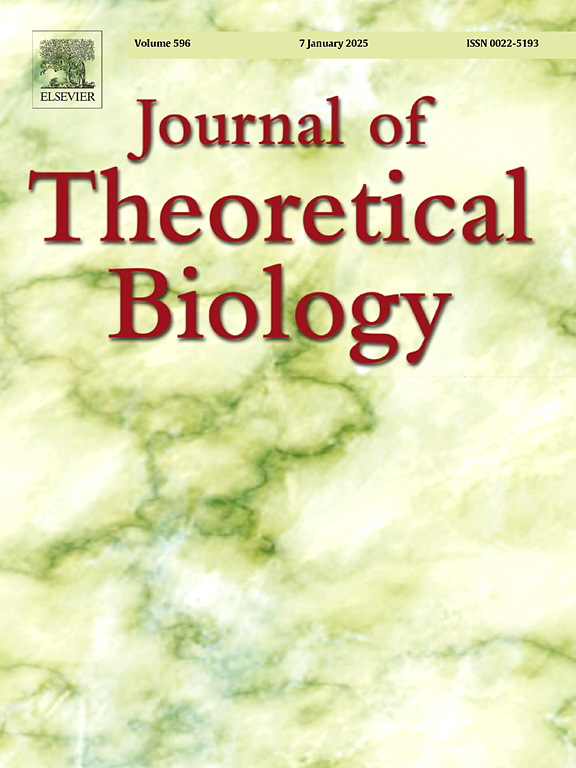Learning to hunt: A data-driven stochastic feedback control model of predator–prey interactions
IF 1.9
4区 数学
Q2 BIOLOGY
引用次数: 0
Abstract
The dynamics unfolding during predator–prey interactions encapsulate a critical aspect of the natural world, dictating the survival and evolutionary trajectories of animal species. Underlying these complex dynamics, sensory-motor control strategies orchestrate the locomotory gates essential to guarantee survival or predation. While analytical models have been instrumental in understanding predator–prey interactions, dissecting sensory-motor control strategies remains a great challenge due to the adaptive and stochastic nature of animal behavior and the strong coupling of predator–prey interactions. Here, we propose a data-driven mathematical model describing the adaptive learning response of a dolphin while hunting a fish. Grounded in feedback control systems and stochastic differential equations theory, our model embraces the inherent unpredictability of animal behavior and sheds light on the adaptive learning strategies required to outmaneuver agile prey. The efficacy of our model was validated through numerical experiments mirroring crucial statistical properties of locomotor activity observed in empirical data. Finally, we explored the role of stochasticity in predator–prey dynamics. Interestingly, our findings indicate that varying noise levels can selectively favor either fish survival or dolphin hunting success.
学习狩猎:数据驱动的捕食者-猎物相互作用的随机反馈控制模型。
在捕食者-猎物相互作用过程中展开的动态囊括了自然世界的一个关键方面,决定了动物物种的生存和进化轨迹。在这些复杂的动态背后,感觉-运动控制策略协调了保证生存或捕食所必需的运动门。虽然分析模型有助于理解捕食者-猎物相互作用,但由于动物行为的适应性和随机性以及捕食者-猎物相互作用的强耦合性,解剖感觉-运动控制策略仍然是一个巨大的挑战。在这里,我们提出了一个数据驱动的数学模型来描述海豚在捕鱼时的适应性学习反应。基于反馈控制系统和随机微分方程理论,我们的模型包含了动物行为固有的不可预测性,并阐明了战胜敏捷猎物所需的适应性学习策略。通过数值实验验证了我们模型的有效性,该实验反映了在经验数据中观察到的运动活动的关键统计特性。最后,我们探讨了随机性在捕食者-猎物动力学中的作用。有趣的是,我们的研究结果表明,不同的噪音水平可以选择性地有利于鱼类的生存或海豚的狩猎成功。
本文章由计算机程序翻译,如有差异,请以英文原文为准。
求助全文
约1分钟内获得全文
求助全文
来源期刊
CiteScore
4.20
自引率
5.00%
发文量
218
审稿时长
51 days
期刊介绍:
The Journal of Theoretical Biology is the leading forum for theoretical perspectives that give insight into biological processes. It covers a very wide range of topics and is of interest to biologists in many areas of research, including:
• Brain and Neuroscience
• Cancer Growth and Treatment
• Cell Biology
• Developmental Biology
• Ecology
• Evolution
• Immunology,
• Infectious and non-infectious Diseases,
• Mathematical, Computational, Biophysical and Statistical Modeling
• Microbiology, Molecular Biology, and Biochemistry
• Networks and Complex Systems
• Physiology
• Pharmacodynamics
• Animal Behavior and Game Theory
Acceptable papers are those that bear significant importance on the biology per se being presented, and not on the mathematical analysis. Papers that include some data or experimental material bearing on theory will be considered, including those that contain comparative study, statistical data analysis, mathematical proof, computer simulations, experiments, field observations, or even philosophical arguments, which are all methods to support or reject theoretical ideas. However, there should be a concerted effort to make papers intelligible to biologists in the chosen field.

 求助内容:
求助内容: 应助结果提醒方式:
应助结果提醒方式:


